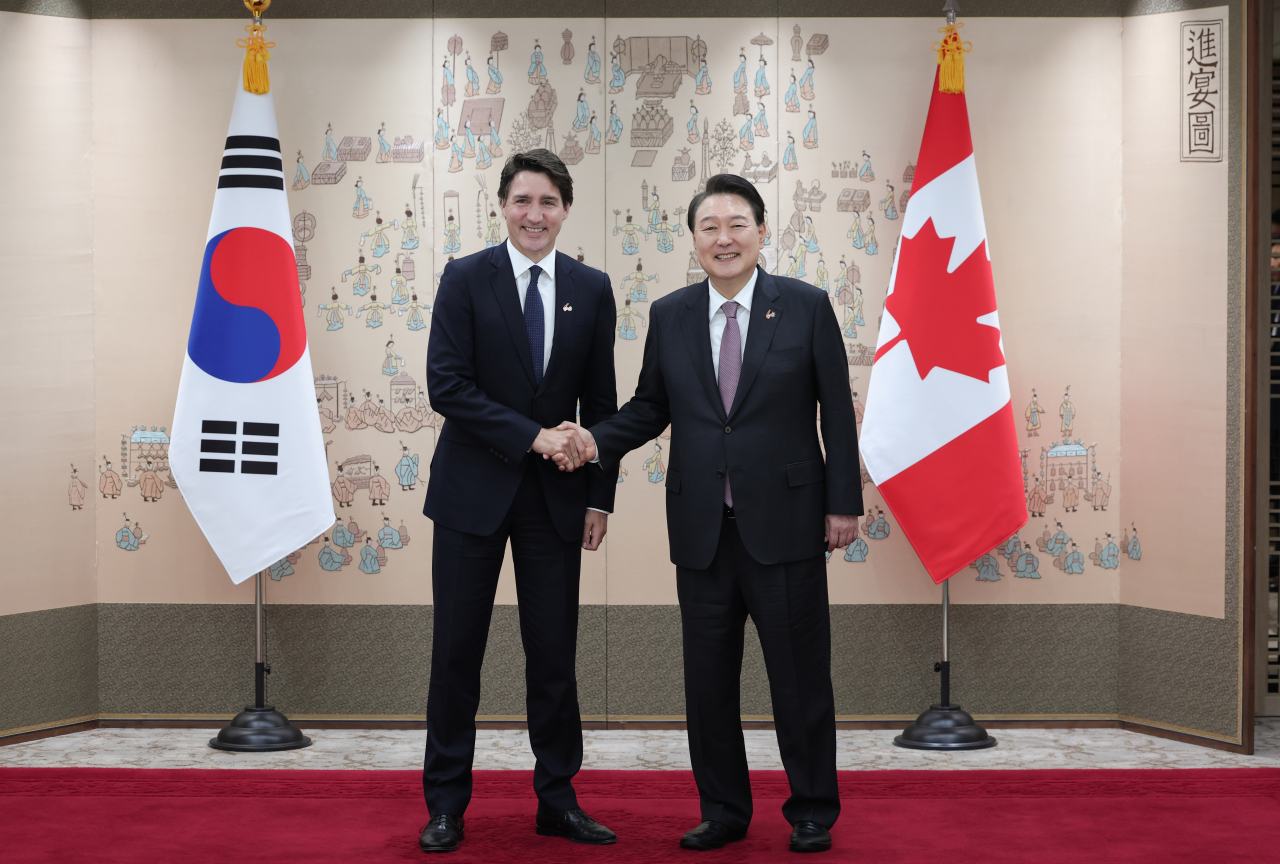 |
President Yoon Suk Yeol (right) and Canadian Prime Minster Justin Trudeau shake hands before talks at the presidential office in Seoul on Wednesday. (Yoon’s office) |
President Yoon Suk Yeol and Canadian Prime Minster Justin Trudeau agreed to build on common economic and security priorities set out in their Indo-Pacific strategies at a summit in Seoul on Wednesday.
The highlight of the three-day trip by Trudeau that ends Thursday comes as Yoon seeks economic partners while attracting support for his efforts for North Korean denuclearization.
“We have jointly denounced growing nuclear threats from North Korea, which thwart regional peace and stability. We have agreed to enhance cooperation over shedding light on rights abuses in the isolated country,” Yoon said at a press conference following the talks, meant to mark 60 years of ties.
Trudeau also called out Pyongyang on its violations of international sanctions placed on its nuclear and missile programs, urging the isolated country to return to dialogue. He singled out rights abuses as a concern to closely monitor together.
“We will also continue our work to support human rights organizations in North Korea, understanding North Korean people are the first victims of the terrible regime in North Korea,” Trudeau said.
The Canadian prime minister likened the need to improve the situation on North Korea’s rights abuses to the values that drove the democratic uprising that took place in 1980 to protest an authoritarian regime in South Korea.
Meanwhile, Yoon welcomed Ottawa’s bid to join the Indo-Pacific Economic Framework, a US-led coalition representing roughly 40 percent of global gross domestic product.
“Seoul and Ottawa have also signed memorandums of understanding on critical minerals and supply chains,” Yoon said, noting the ever-expanding economic ties will include cooperation on “chips, batteries, future industries like artificial intelligence and small modular reactors and clean energy.”
For the first time Tuesday, the foreign and trade ministers from the two countries held senior-level talks, a consultative body that is expected to take place regularly so the two “North Pacific partners” could build on business ties, according to the Foreign Ministry in Seoul.
The two leaders also shook hands on expanding grassroots-level exchanges between young people, with Yoon stressing the deals signed would pave the way for “exchange students and those looking for jobs” in each other’s countries.
The agreements include an increase in the annual working holiday quota from 4,000 to 12,000, with eased limits on age and working hours.
“Canada and Korea share deep and historic friendship. We also share dynamic ties between our people. … We welcome thousands of Korean students to our universities every year and now we want to do even more,” Trudeau said.
He added that such exchanges will “result in more work and travel opportunities for young people in Canada and Korea,” noting “This will help young Canadians and Koreans acquire international experience while strengthening the ties between our people.”
“Another thing we share is our desire to build a cleaner and more prosperous future for our countries,” Trudeau said, highlighting agreement for joint action on climate change.
Hours ahead of the summit, Trudeau met with National Assembly Speaker Kim Jin-pyo and the leaders of the ruling and main opposition parties. The Canadian prime minister addressed the Assembly in a 20-minute speech.
Trudeau will fly to Hiroshima, Japan on Thursday for the Group of Seven summit. Tokyo is hosting the annual gathering discussing global priorities from Friday to Sunday.







